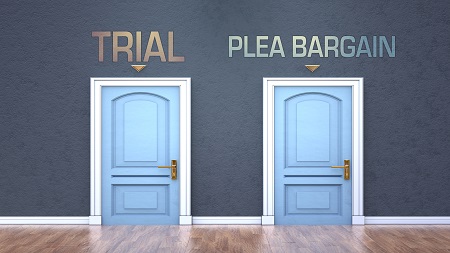Have you been accused of a crime? Perhaps you have heard the term “plea bargain.” Our criminal justice system often uses a plea bargain process to resolve cases. A plea bargain is a negotiated agreement between both sides, prosecution and defense.
In this guide, you’ll glean insight from criminal defense attorney, Tom Carley on when and how to consider these negotiated settlements.
We will unpack the concept, weigh the pros and cons, and share negotiation strategies.
You will also learn what mistakes to avoid and how to collaborate effectively with your attorney.
Equip yourself with the knowledge to navigate the complex world of plea bargains confidently.
Understanding the Concept of Plea Bargains
While considering the concept of plea bargains, it’s essential that you also consider the potential benefits and drawbacks.
A plea bargain, typically used in criminal proceedings, is a negotiated agreement between the prosecution and defense where you, the defendant, agree to plead guilty to a lesser charge or receive a reduced sentence. It’s a strategic move that can expedite the legal process, minimize court costs, and provide certainty of outcome.
However, it is important to understand that a plea bargain requires you to waive your right to a trial. A trial could potentially clear your name if a jury agrees with you and finds you “Not Guilty.” With a plea bargain, you are accepting a criminal record that potentially might impact your future employment or reputation.
Evaluating the Pros and Cons of Plea Bargains
In the context of plea bargains, you’re now tasked with examining the pros and cons, a crucial step that will help you make an informed decision.
- Reduced Sentences: Plea bargains often lead to lesser sentences. This might be beneficial if you are facing severe charges. If you go to trial and a jury finds you guilty, you are often facing harsher penalties.
- Case Resolution Speed: With a plea deal, you are avoiding a lengthy trial. It’s a quicker resolution that saves you time and stress.
- Court Costs: Trials are expensive. A plea bargain can significantly lower your court-related expenses.
- Certainty: A plea bargain gives you a certain outcome. Trials, on the other hand, are unpredictable.
However, it’s important to remember that pleas also have downsides. You’re admitting guilt, which could impact future employment or personal reputation. Each case is unique, so it is always a good idea to consult with your attorney before making such an important decision.
Determining the Right Time to Consider a Plea Bargain

You’ve weighed the pros and cons, and now it’s time to determine when to consider a plea bargain, a difficult decision that involves both the gravity of your charges and the strength of your defense strategy.
This isn’t a decision to make lightly. If your charges are severe, but your defense is weak, a plea bargain could lessen your sentence. Alternatively, if your case presents a solid defense, you might want to consider arguing your case at trial.
It’s crucial to understand the prosecution’s case against you. If their evidence is substantial, it might be in your best interest to negotiate a plea. Remember, it’s not only about the charges but also about the potential outcome at trial. Our office understands the complexity of the justice system. We understand when a case should settle and when a case should go to trial. We provide honest and transparent advice to our clients.
An experienced lawyer can guide you through this complex decision-making process.
Strategies for Negotiating Plea Bargains
There are several strategies you can use for negotiating a favorable plea bargain, but it’s crucial to remember that every case is unique and requires a different approach. Knowing the ins and outs of the legal system is important, and understanding the prosecution’s position is essential.
Here are four key strategies:
- Do your homework: Researching the prosecution’s evidence can give you an edge in negotiations.
- Weigh your options: Consider the potential sentence if convicted at trial versus the proposed plea deal.
- Negotiate effectively: Be prepared to make counteroffers, and don’t be afraid to push for a better deal.
Seek legal advice: Criminal defense services can provide invaluable guidance.
Common Mistakes to Avoid in Plea Bargain Negotiations
Don’t overlook the common mistakes that can trip you up in plea bargain negotiations. It’s paramount to understand the criminal charges fully. If you’re unclear, you may unwittingly accept a deal for a more serious offense.
Similarly, don’t rush into an agreement without first scrutinizing the evidence. It is your right to review discovery, and you should exercise it.
Ensure you’re aware of the implications of your plea on your criminal record. A careless plea can lead to unforeseen consequences, like loss of employment, loss of driving privileges or loss of voting rights.
Lastly, don’t negotiate without legal counsel. Even if you’re well-versed in legal jargon, a skilled attorney’s perspective is invaluable. They can help you discern if a plea is truly in your best interest.
How to Work With Your Attorney Toward a Plea Bargain
In working with your attorney on a plea bargain, it’s crucial to maintain open lines of communication and ensure you’re both on the same page at every step of the way. Here’s a 4-step guide to help you:
- Understand the Process: Plea bargaining isn’t straightforward. It’s a negotiation, which means you’ll need to comprehend legal terms and potential consequences.
- Be Transparent: Don’t withhold information from your attorney. They can’t help if they don’t know the full story.
- Ask Questions: If you’re unsure about anything, ask. It’s your attorney’s job to clarify and guide you.
- Consider Alternatives: If a plea deal doesn’t seem favorable, explore other options. Remember, you are not obligated to accept a deal.
Your experienced attorney is your ally. Work together to secure the best outcome on your legal matters. Find a criminal defense law office that can work with you.
Carley Legal Services Can Help You Navigate Plea Bargains and Determine What Is Best for You
At Carley Legal Services, Tom Carley understands the world of plea bargains and can expertly guide you, ensuring your decisions are well-informed and best suited to your unique situation. If you’re charged with a felony crime, it’s crucial to plead ‘not guilty’ to safeguard your rights, defenses, and options. This move signifies a strategic step in establishing a strong defense.
Being released from jail might require you to post bail or comply with certain conditions, such as reporting to a probation officer. It’s a complex process, and that’s where we come in. We’re committed to providing an effective defense, diligently investigating your accusers, and clearly explaining your options. We’re not just about guiding you, but also about ensuring your path is well-lit with knowledge and strategy.
Should you opt for negotiation, we’re adept at managing plea bargains. Alternatively, if you prefer to proceed to trial, we’re equally prepared to fiercely advocate for you. Our ultimate goal? To secure the best possible outcome for you. Trust us to navigate the legal maze of plea bargains for you – we’re experts at turning complications into solutions.
Contact us today for a legal defense team that cares and provides effective representation.
The wide range of services our criminal defense lawyers provide:
- Domestic Violence Charges
- DUI Charges
- Felony Charges
- Reckless Driving Charges
- Violent Crime Charges
- Gun Rights
- Drug Charges
- And More
Visit Tom Carley’s About page for more information about his legal defense services.


